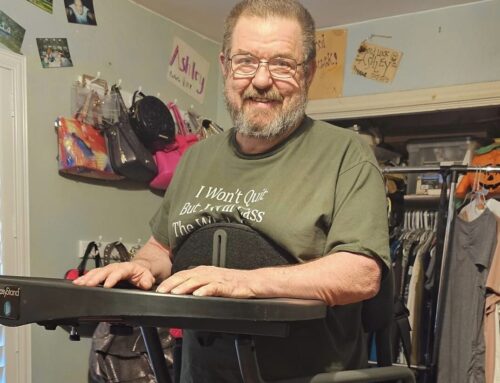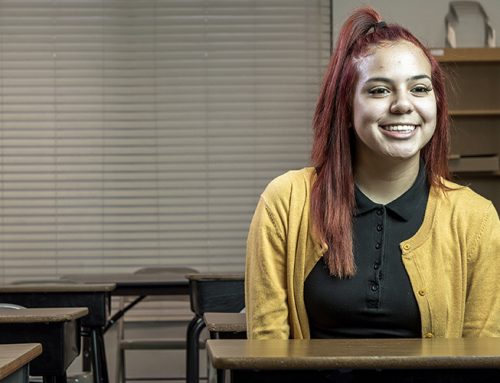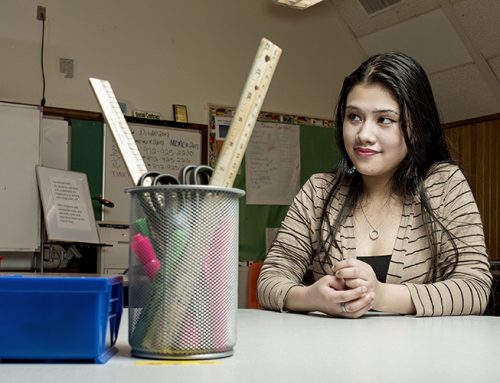It was a warm summer night when Jennifer Macias died.
The senior at Woodrow Wilson High School and captain of the Sweethearts Drill Team, climbed into the passenger’s seat of her cousin’s car after a soccer game. It was after 10 o’clock but they had nowhere to be, so they decided to joyride until Macias’ curfew at midnight.
“We were just driving around, and for some reason we were speeding,” Macias says, although she doesn’t actually remember speeding. That’s just what she has since been told.
“We were going 100 miles per hour, and apparently — I don’t remember — I was recording it on my snapchat. That was the last video I posted.”
While making a turn, Macias’ cousin lost control of the car and slammed into a pillar, striking Macias’ side of the vehicle.
It was 45 minutes before emergency officials could pry Macias, unconscious and bleeding extensively from the pelvis, out of the vehicle. It was almost too late. She died in the ambulance on the way to the hospital, but paramedics were able to revive her.
The next thing Macias remembers is being in the hospital weeks later. Although she’d been conscious, a brain injury caused memory loss and other complications.
“I don’t really remember the hospital days, especially those first few weeks,” she explains. “I had no memory of what happened. I didn’t know what had happened to me, or how bad it was, until after I got out of the hospital.”
Her body was crushed from head to toe. She had arch bars on her teeth to prevent them from falling out, metal plates in her pelvis and hip socket and multiple metal rods and screws in her legs.
In an instant, life as she knew it was halted. For weeks she couldn’t talk and every movement was an excruciating effort. She certainly wouldn’t be dancing anytime soon.
After joining as a freshman and making it to captain her senior year, Macias was a staple on the Sweethearts squad and in the Woodrow dance program.
“The moment I saw her throw her first kick her freshman year, I knew she’d be captain her senior year,” says Lisa King, Woodrow dance teacher, who heads the Sweethearts team.
“Her form, her flexibility, and she has a very special presence while dancing. It doesn’t matter who’s dancing, your eye is always drawn to Jenn.”
She was fluent in all forms of dance from classical to jazz to cultural. Dance was all Macias wanted to do. Although her future as a dancer suddenly looked shaky, her friends and teammates refused to give up on her.
The day after the accident, King called the drill team’s second in command, Sophia Landers.
“The first thing [Landers] said to me was, ‘I don’t want to be captain. Jenn is our captain,’” King recalls.
“That told me in an instant how much [Macias’] team admired her. The admiration her team had for her made me realize that, no matter what happened, the girls would not have it any other way: She would always be our captain, whether she pulled through or not.”
Macias hadn’t recovered by the time football season arrived, so her spot at the 50-yard line remained empty.
At every game, the announcers introduced the officers, and when they announced Macias, they dedicated the halftime performance to their “fearless captain,” and always ended with, “We kick for you, Jenn.”
Watching recordings of the halftime shows was bittersweet for Macias.
“That was really nice of them, but it was sad and it was hard,” she explains, “because I was in a hospital bed. I couldn’t be with them on Friday nights, on my last year.”
It wasn’t until Macias was released from the hospital, bound to a wheelchair for long distances and a walker for short distances, that the emotions really hit her hard.
“I missed being home, but it hit me how much had changed,” she says. “It was weird. It felt so good being home. It felt like everything was normal, but it wasn’t. I would stay up late most nights. I would go on YouTube and watch old videos of me dancing. It made me more sad, but it felt good seeing it and crying.”
King made it clear Macias was still a part of the Woodrow dance program and put Macias to work helping a group of students with their choreography for “The Nutcracker.”
“It felt nice to be back, yet at the same time it was painful seeing them,” she explains.
Macias was slowly but steadily recovering, but she still felt like she had to cut out dance and completely rethink her future.
“Before [dance] I wanted to go into education,” she points out. “I like teaching, so I thought, ‘OK, maybe I can go into education.’”
When Macias went to King for advice, she was encouraged not to give up on dance.
King had also been in a near-fatal accident just a few weeks after she graduated high school. Like Macias, she was shaken both physically and emotionally, but she eventually pushed through and continued to dance.
She insisted Macias could do the same, although at first Macias wasn’t so sure.
“I told her, ‘I don’t know if I can do it. Just because you could do it doesn’t mean I’m strong. I’m not strong like you,’” Macias remembers. “It was kind of impossible for me to see myself dancing again after everything that happened.”
But King’s words resonated. Macias applied to the dance program at Texas Women’s University and in March found out she was accepted as a dance major.
“She has always inspired others,” King says. “She’s special, and now she has fought her way back from this tragedy.”
Determined not to let the accident prohibit her, Macias is moving forward and working toward becoming a dance teacher.
“People tell me all the time, ‘Don’t let [the accident] define you.’ I just listen to that,” she says. “Life keeps going, you know? I’m not always going to be stuck in a wheelchair, so I have to think about my future.”





